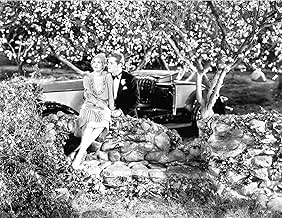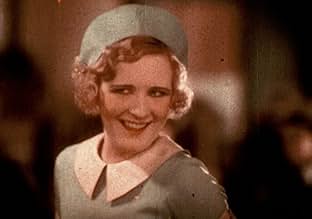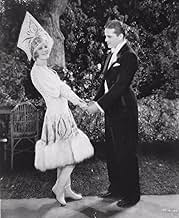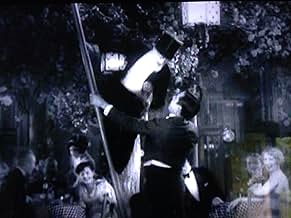Añade un argumento en tu idiomaSally was an orphan who got her name from the telephone exchange where she was abandoned as a baby. In the orphanage, she discovered the joy of dancing and has been practicing since. Working... Leer todoSally was an orphan who got her name from the telephone exchange where she was abandoned as a baby. In the orphanage, she discovered the joy of dancing and has been practicing since. Working as a waitress, she goes from job to job until she finds a job that also allows her to dan... Leer todoSally was an orphan who got her name from the telephone exchange where she was abandoned as a baby. In the orphanage, she discovered the joy of dancing and has been practicing since. Working as a waitress, she goes from job to job until she finds a job that also allows her to dance. At the restaurant, she meets Blair, and they both fall for each other, but Blair is en... Leer todo
- Nominado para 1 premio Óscar
- 1 nominación en total
- Undetermined Role
- (sin acreditar)
- Cafe Customer
- (sin acreditar)
- Chorus Girl
- (sin acreditar)
- Party Guest
- (sin acreditar)
- Cafe Customer
- (sin acreditar)
- Girls in dance number
- (sin acreditar)
Argumento
¿Sabías que...?
- CuriosidadesOriginally presented in 100% two-color Technicolor, at present the complete film survives only in black and white, with a singular musical number, "Wild Rose," in color.
- Citas
Otis Hooper: [to 'Connie', the waiter] I have 10 bucks - and only 10 bucks.
[opens the menu]
Otis Hooper: What would you suggest?
'Connie': Another restaurant.
- ConexionesFeatured in Broadway: El musical americano (2004)
- Banda sonoraSally
(1920) (uncredited)
Music by Jerome Kern
Lyrics by Clifford Grey
Played during the opening credits and often in the score
Sung by Alexander Gray and Chorus
Danced by Marilyn Miller and Joe E. Brown
Danced by Miller and Albertina Rasch Dancers at the follies
The story revolves around Sally Green (Marilyn Miller), a young woman raised in an orphanage now earning a living as a waitress at a crowded New York City restaurant, whose one ambition is to become a dancer. After Sally makes an impression on Otis Hooper (T. Roy Barnes), a theatrical agent dining with Rosie (Pert Kelton - almost unrecognizable as a brunette), she loses her chance as well as her job when she accidentally spills a tray of food all over him. Sally acquires another job waiting on tables at the Elm Tree Inn managed by "Pops" Shendoroff (Ford Sterling), with Connie (Joe E. Brown), formerly Constantine, Grand Duke of Checkercovinia, working as a waiter. Sally soon makes the acquaintance of Blair Farell (Alexander Gray), the son of an aristocratic father (E.J. Ratcliffe) who arranged for him to marry socialite Marcia Ten Brook (Nora Lane). Blair, who had earlier noticed Sally through the window of the restaurant, takes an interest in Sally and arranges to have Schendorff dance for the customers, one of them being Otis Hooper. Hooper later encourages Sally to perform at Mrs. Ten Brook's (Maude Turner Gordon) garden party, which she does, under the guise of Madame Noskerova, the famous Russian dancer, at the same time Connie makes his grand entrance as the Grand Duke. When Schendorf gives away their identities, Mrs. Ten Brook orders Sally to leave, which she does after hearing Blair's announced engagement. Although Sally achieves stardom dancing for the Ziegfeld Follies, she finds she's unable to forget about Blair.
With music and lyrics by B.G. DeSylva, Al Dubin, Joe Burke, Clifford Grey and Jerome Kern, the musical program is as follows: "Look For the Silver Lining" (sung by Alexander Gray and Marilyn Miller); "Sally" (sung by Alexander Gray); "Look For the Silver Lining" "Sally" and "Look For the Silver Lining" (danced by Miller and Joe E. Brown); "If I'm Dreaming, Don't Wake Me Too Soon" (duet by Miller and Gray); "Walking Off These Balkan Blues" (danced by Joe E. Brown); "All I Want to Do Do Do is Dance" (sung by Miller); "Wild Rose" (sung by Miller and male chorus); "If I'm Dreaming, Don't Wake Me Too Soon" (reprise by Miller and Gray); Russian dance number performed by the Albertina Rasch Ballet; and "Broadway Follies" instrumental ballet/ dance numbers (performed by Miller).
With SALLY available in black and white format, only the "Wild Rose" dance sequence survives in its original, yet slightly fuzzy, Technicolor form. The song, "Look for the Silver Lining," most associated with Miller, was used as the title to a Warner Brothers 1949 bio-pic starring June Haver as Marilyn Miller. If the score to "If I'm Dreaming" sounds familiar, it was used for a dance sequence between Douglas Fairbanks Jr. and Glenda Farrell in the gangster classic, LITTLE CAESAR (1930) starring Edward G. Robinson. Alexander Gray, a deep voice baritone, notable for his screen teaming with Bernice Claire in early Warners musicals of 1929-30, is acceptable as the leading man, though wasn't quite the type to survive the movie medium to the next decade. Joe E. Brown, still early in his career before starring in his own comedies, has little opportunity being funny but does provide some highlights, including a comedy dance with Miller, and another as a waiter escorting an old man (Jack Duffy) and his young date (Ethel Stone) up a latter to their table with a view, proving to be troublesome for all.
As for Marilyn Miller, she would follow SALLY with more singing, dancing and romancing with SUNNY (1930) and HER MAJESTY, LOVE (1931) before returning to Broadway. Of the three, SALLY is most acceptable mainly for being a recorded document of her stage play, while SUNNY, another screen adaptation, disappoints for anyone who had seen the stage version to find much of the original score missing from the final print. HER MAJESTY, LOVE, intended to be something original, offered nothing new in the genre of sophisticated director, Ernst Lubitsch.
With so many 1929-30 musicals currently lost or incomplete, SALLY was fortunate to have survived intact at 100 minutes, even without the color. Unavailable for viewing since its initial theatrical release, SALLY made it to television on Turner Classic Movies in August 1994, where this and other Marilyn Miller musicals enjoyed occasional revivals for the next few years. (***)
- lugonian
- 16 feb 2009
- Enlace permanente
Selecciones populares
Detalles
Taquilla
- Presupuesto
- 647.000 US$ (estimación)
- Duración1 hora 43 minutos
Contribuir a esta página


































